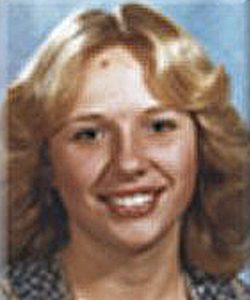Maine’s Supreme Judicial Court on Thursday upheld the 2018 conviction of an East Millinocket man who killed 16-year-old Joyce McLain in 1980, finding that the trial court did not violate his religious privilege when it considered a confession he made to a pastor and others.

Philip Scott Fournier, 57, had long been a suspect in the case and made a series of increasingly incriminating confessions in the years following the killing, but he was not charged until March 2016, when detectives with the Maine State Police gathered enough new evidence to arrest him.
Fournier was convicted in 2018 by a Penobscot County judge – he waived a jury trial – and was sentenced to 45 years in prison.
McLain, a sophomore at Schenck High School in 1980, went for a jog on a hot August evening and never returned home.
Her body was found in a wooded area behind the school ball field near a row of power lines. She was beaten to death with a blunt object, later determined to be a ceramic utility pole insulator.
The investigation was hampered by strong thunderstorms that rolled through the East Millinocket area after McLain was killed, likely washing away evidence in the process. There was no forensic evidence that tied Fournier to the crime scene.
The case also helped urge legislators to pass funding for the state’s first cold-case squad.
The case against Fournier was built on admissions he made over a series of years.
Among the evidence that prosecutors used was Fournier’s admission to a pastor in 1981, nine months after the murder, that he had killed McLain. The pastor said he would not believe Fournier unless he also told his parents, which Fournier did. The pastor then drove Fournier to the Bangor police station and he told investigators that he hit McLain with an insulator. Police, however, decided not to arrest him for reasons that have not been revealed in court.
Fournier, who was spotted near the high school drinking whiskey with friends on the night of the killing, told state police that he left a party alone later that night and remembered that he tripped over a woman’s body while he was stumbling around in the woods, but he denied killing McLain.
Then in 1989, when Fournier was hired as a janitor at Husson College, he told his supervisor during a casual conversation that he had killed McLain and beaten all of the police interviews.
Fournier appealed his conviction to Maine’s Supreme Judicial Court on the grounds that the trial court violated his religious privilege by allowing testimony about his admissions to the pastor, but the high court disagreed, and said Fournier waived his privilege when he also admitted to his parents that he had killed McLain.
The high court also rejected arguments that the trial court failed to consider alternative suspect evidence, and erred when it did not allow a detective to testify as to why the Bangor detectives did not arrest Fournier after he told them he had killed McLean.
Matt Byrne can be contacted at 791-6303 or at:

Comments are not available on this story. Read more about why we allow commenting on some stories and not on others.
We believe it's important to offer commenting on certain stories as a benefit to our readers. At its best, our comments sections can be a productive platform for readers to engage with our journalism, offer thoughts on coverage and issues, and drive conversation in a respectful, solutions-based way. It's a form of open discourse that can be useful to our community, public officials, journalists and others.
We do not enable comments on everything — exceptions include most crime stories, and coverage involving personal tragedy or sensitive issues that invite personal attacks instead of thoughtful discussion.
You can read more here about our commenting policy and terms of use. More information is also found on our FAQs.
Show less